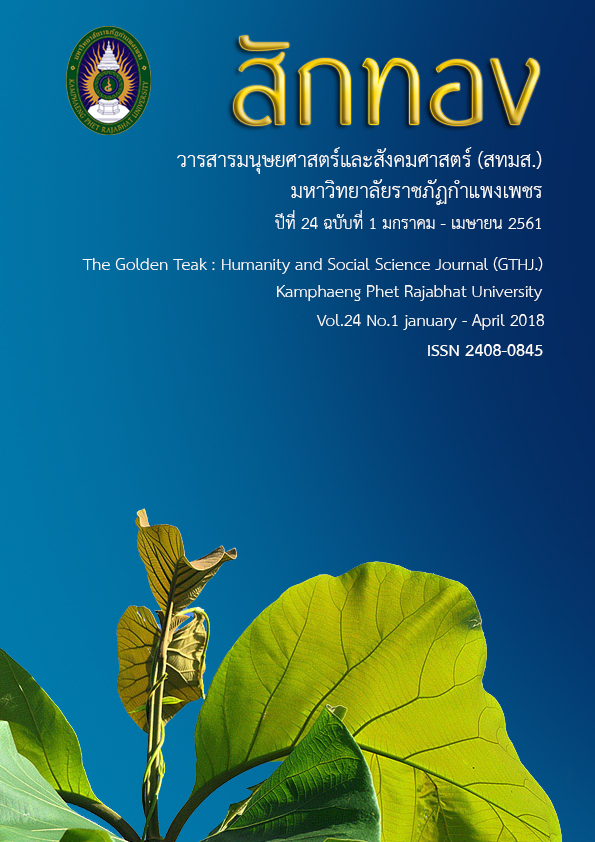The Instruction Focuses on Research : Instructional Paradigm in the 21st Century
Main Article Content
Abstract
ABSTRACT
Research-based Learning encourages learners to self-discover the knowledge and learning begins from eagerness to disclose knowledge and they have to apply various strategies in search for the right and answers by rational summary with clear logic and reliability. The learning process in this regard comprises five steps. Step 1: Define the problem (Question); Step 2: Determine how to solve problems (Learn); Step 3: Processing information (Answer); Step 4: Analyze information (Investigation); and Step 5: Conclusion (Summarize). Learning under this environment would promote learners to get higher learning achievement, research knowledge, positive attitude towards research, ethics in doing research, collaborative learning, critical thinking, problem-solving skills, creative and innovative skills, cooperation, teamwork and leadership skills, better understanding on cross-cultural perception, IT and media literacy skills, computer and communication skills. This also includes career skills, learning skills, and adaptation skills as these skills are crucial for the learners to use and apply knowledge and skills in order to live a happy life in the 21st century.
Article Details
บทความที่ได้รับการตีพิมพ์เป็นลิขสิทธิ์ของวารสาร สักทอง : วารสารมนุษยศาสตร์และสังคมศาสตร์ สถาบันวิจัยและพัฒนา มหาวิทยาลับราชภัฏกำแพงเพชร
ข้อคิดเห็นใดๆ ที่ปรากฎในวารสารเป็นวรรณกรรมของผู้เขียนโดยเฉพาะ ซึ่งมหาวิทยาลัยราชภัฏกำแพงเพชรและบรรณาธิการไม่จำเป็นต้องเห็นด้วย
References
Bangkok : Ladprao Teachers Council.
Anuphabsaenyakorn, P. (2012). Learning Management : The Project for the 60th
Anniversary His Royal Highness Crown Prince Maha Vajiralongkorn in
Northerneast Rajabhat Universities. Mahasarakam : Mahasarakam Rajabhat
University.
Bunterm, T. (2003). Research-based Learning. Journal of Education, Faculty of
Education Khon Kaen University, 27(2), 64-76.
Chusreewun, K. (2012). Developing Grade-12 Students’ Knowledge Searching Skill
And Learning Achievement in Fundamental Social Studies Course (SOC 33102)
using Research-Based Learning Model at Kalasin Pittayasan School. Thesis M.Ed, Khon Kaen Faculty of Education Khon Kaen University.
Dounglamai, T. (2005). The Development of Learning Activities, Research-Based
Scientific Learning Management on Riverside’s Ways of Life.
Bangkok : Ladprao Teachers Council.
Intun, S. (2015, October-December). The Study of Academic Achievements by Research-based
Learning Method for the Students Enrolling in CI 2301 : Principle of Learning
Management. Journal of Education, Mahasarakham University, 9(4).
Khuana, K. & Khuana, T. (2016, January-June). Informal Education for the 21st Century.
Education Journal Faculty of Education Kamphaengphet Rajabhat University, 1(1),
68-75..
_______. (2016B). Designing Instructional Model through Impressive Educational Students
with the Indoctrinating Research-Based Strategies to their Creative Thinking Skills
at the Faculty of Education in Kamphaeng Phet Rajabhat University.
Kamphaeng Phet : Kamphaeng Phet Rajabhat University.
Kiatchot, P. (2002). New Educational Paganism Shifts in the 21st Century. Bangkok :
Education.
Nakaratap, A. (2003). Research Guidelines for Research and Fieldwork-Based
Instructional Management Served for General Education and Social Studies
Course. Cited in Paitoon Sinlarat (Editor). Research-Based Instructional Management.
Bangkok : Faculty of Education, Chulalongkorn University.
Panich, W. (2014). Initializing Learning into the 21st Century. Bangkok : Siam Kammachom Foundation.
Parnichparincha, T. (2016, May-August). Transformative Learning : A Learning Management in
Pre-service Teacher Training. The Golden Teak : Humanity and Social Science
Journal (GTHJ.), 22(2), 1-11.
Pithiyanuwat, S. & Boonteum, T. (2003). Research-Based Learning. Bangkok :
Faculty of Education, Chulalongkorn University.
_______. (1994). Research-Based Learning. Research Methodology Journal Education,
Chulalongkorn University, 6(1), 1-14.
Poungkham, T. & Silanoi, L. (2011). The Research-Based Study of Matthayomsueksa 4
Students’ Learning Achievements and Essential Learning Skills on “S.31104
History II Course”. Master of Education, Khon Kaen University.
Sinlarat, P. (2004). Research-Based Instructional Management. (2 nd ed).
Bangkok : Research Division in Academic Collaboration with Center for Texts and
Academic Work, Faculty of Education, Chulalongkorn University.
Sithkhunthod, W. (2013). A Study of Research-Based Learning Management Designed
for BUS304 Course Business Research. Bangkok : Center for Pedagogical Supports
and Development, Sriprathum University.
Sutthirat, C. (2010). New Learning Management. Nonthaburi : Sahamittra Printing
Publishing.
Tammachart, J. (2012, January-March). A Research and Development of Research- Based
Learning Management Model in the Educational Research Course. Songklanakarin
Journal of Social Sciences and Humanities, 18(1), 183-214.
Wanmanee, Y. (2005). The Development of Matthayomsueksa 5 Students’ Research-
Based Learning Activities and PDCA-Based Instructional Management on Working
Process in Thasala Prasith School. Bangkok : Ladprao Teachers Council.
Waree, C., et al. (2015). The Research-Based Development of Education Faculty
Students’ Research Skills on Data Analysis and Summary in Suansunantha
Rajabhat University. The 2015 Annual University Report : Suansunantha Rajabhat
University.
Wiangwalai, S. (2013). Learning Management. Bangkok : Odian Store Press.

